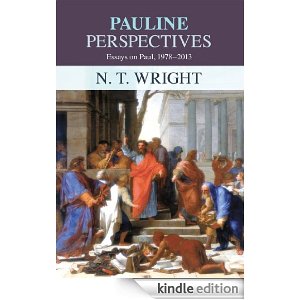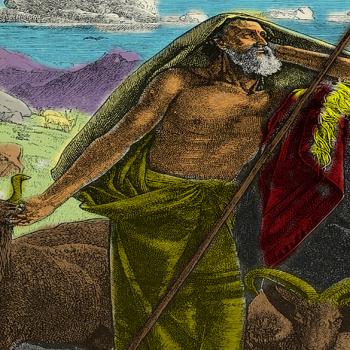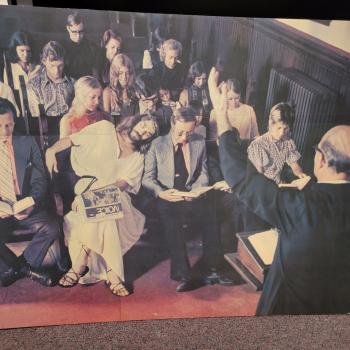The question of ‘Paul and Empire’ has come up suddenly these last twenty years; in the late 1980s almost nobody was thinking about it, and now it’s all over the place — in more ways than one. That is, lots of people are writing about it and there is no consensus! That is to be expected. But there are two quite different things going on which get confused. On the one hand, there is the serious historical attempt, in line with things said by e.g. Deissmann, to plot how Paul would have been heard in a world where the ‘gospel’ about the ‘son of God’ who was ‘lord of all’ etc was quite clearly about Caesar. Did Paul intend those echoes, and if he didn’t why didn’t he do a better job of avoiding them? On the other hand, there are those who approach Paul not in order to attempt proper historical analysis but in order to address him with questions from our own world with its shifting moralsands: how do we judge Paul in terms of his wrestling with issues we are aware of today? Some, of course, sit uneasily between these two. Some, reacting against the rather obvious political bias of writers like Horsley and Crossan, declare that the whole thing is an unnecessary fad…
The latter reaction is understandable but in my view wrong. The idea that the gospel has nothing to do with socio-political realities would have puzzled most of our forbears; it’s only in the Lutheran ‘two kingdoms’ world, and then in the post-Enlightenment Platonic world where ‘going to heaven’ is the only thing that matters, that one might imagine Jesus to be simply wrong when he says (Matthew 28) that he already possesses all authority in heaven AND ON EARTH. Much western theology has simply ignored Paul’s claim in Rom 5 and 1 Cor 15 that Jesus is already reigning . . .
The question is, how you work it all out. Here we are hamstrung because most modern Christians simply aren’t aware that there is a long and complex Christian tradition of wise people thinking and writing about these things. We tend to lapse into a lazy all-or-nothing position: either we (and Paul) are out and out revolutionary Marxists, or we are quiescent citizens who don’t want to get our hands dirty with the messy world of ‘politics’. My own view — not least after seven years in the British House of Lords! — is that if Jesus is not Lord of all, he is not Lord at all — but that this lordship is of a very different sort from those of the world. Here Mark 10.35-45 has been very important to me: Jesus declares that while the rulers of the earth run things by bossing and bullying, we are to do it the other way, the way of the servant. But note, we are to do it . . . we already share the ‘rule’ of the crucified, interceding Messiah. That’s partly what Romans 8.18ff. is all about.
So, in my big book on Paul, I have set out in considerable detail how the Roman imperial ideology worked and functioned in the cities where Paul lived and worked. It won’t do to say, as some have tried to do, that the Roman Empire was ‘insignificant’ for Paul because what mattered to him were the ‘cosmic’ powers of sin and death etc. Yes, he certainly down-valued Rome in comparison with its own claims; but in passage after passage he said things which, precisely as historical readers, we need to recognise as having had clear overtones of the alternative lordship of Jesus.
So in a further chapter I have explored, one more time, these passages — notably in Romans, Philippians and 1 Thessalonians, but in other places too — and have argued for a way which is neither the maximalist (all Paul was interested in was subverting Caesar) nor the minimalist (Paul wasn’t interested in Caesar at all), and which tries to integrate his constant implicit political critique with the larger themes of Christology, justification and so on. That is the real challenge.
Underneath all this is the challenge for so many western Christians today, not least in America. Just as the Reformation reading of Paul assumed that he was addressing ‘our’ question (‘how can I find a gracious God’ or ‘how can I be sure of going to heaven’) and thereby misunderstood him, at least partially, so today’s political readings, whether of right or left, regularly assume that he is addressing our questions (‘should we be quiet, apolitical citizens, or should we join the revolution?’), and we have forgotten, or perhaps never realised, that the eighteenth-century polarization of ‘right and left’, which is so unhealthy a feature of modern life — it seems to be crippling the American system as we speak, in mid-October 2013! — is a historical accident, a shallow either/or, which feeds off people’s fear and greed and leads to sterile pseudo-debate and dangerous oversimplifications of policy at home and abroad . . .
In other words, Paul won’t address our concerns in our ways. Thank God for that. He addresses the larger world with the whole gospel, and if — and only if — we learn to listen to his nuanced and subtle message, and the devastating critique of all human arrogance at the heart of it, we might be able to glimpse a larger and wiser way of living….


















